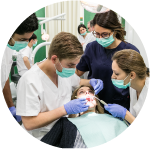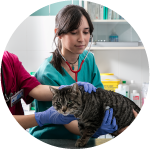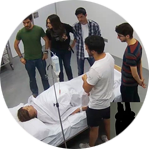More opportunities
Campus in Valencia, Elche and Castellón
What area of postgraduate study are you interested in?
-
education
-
communication
-
business & marketing
-
sport
-
health sciences
-
engineering
-
architecture
-
design
-
law & political
-
veterinary medicine
-
gastronomy
{{key}}
- Duration Credits Language
- {{titulacion.titulo_marketing}} {{titulacion.duracion || '---'}} {{titulacion.creditos || '---'}} {{titulacion.idiomas || '---'}}
No existen titulaciones para los parámetros seleccionados.
{{key}}
- {{titulacion.titulo_marketing}} {{titulacion.duracion || '---'}} {{titulacion.creditos || '---'}} {{titulacion.idiomas || '---'}}
No existen titulaciones para los parámetros seleccionados.
{{key}}
- {{titulacion.titulo_marketing}} {{titulacion.duracion || '---'}} {{titulacion.creditos || '---'}} {{titulacion.idiomas || '---'}}
No existen titulaciones para los parámetros seleccionados.
This is the place for you. Our philosophy at the University is to work closely with the business world, so that our postgraduate programmes reflect what employers are looking for.
We offer more than 60 postgraduate programmes. Master's degrees, qualifications to practise regulated professions, and specific specialization programmes so that you can get the skills you need to stand out in the job market. We offer programmes in Health Sciences, Communications, Law, Political Science, Design, Education, Sport, Business, Marketing, Engineering, Architecture, Veterinary Medicine, and Gastronomy.
We have more than 50 years' experience educating people just like you. Every year more than 1000 people like you register for our postgraduate programmes so that they can take their knowledge and skills to the next level. We help them all the way to get there.
More employability
We are committed to enhancing our students' employability. We are closing in on 90% employability for our students, reaching 100% in many areas.
Our postgraduate programmes include our Transformational Competencies Training Plan, giving you that bit extra to enhance your career prospects. You will develop skills which provide real personal and professional growth and those completing the programme are awarded a microcredential.
The Transformational Comptencies Training Plan at CEU is made up of three practical modules, structured around key soft skills. Soft skills have become an essential part of the armoury of today's professionals. The ever-changing working environment means that the ability to adapt and relate to others effectively is more important than ever. And not only will you get the chance to develop these skills – you will have a microcredential to prove it.

Committed to your employability
Want to know more about the Transformational Competencies Training Plan?
Each module consists of four hours of in-person training sessions, during which you will agree a flexible training schedule with the instructor to suit your learning needs. This schedule will consist of a blend of practical and dynamic activities, a run-through of some theory, self-assessment exercises, peer feedback and some space for reflection.
The Transformational Competencies Training Plan sessions will take place in the first few weeks of your chosen study programme. The Plan now forms part of some of our Master's Degree programmes, and we aim to include it within all our postgraduate programmes in the coming years.
Participants attend three sessions on consecutive days, working on 6 of the 8 CEU competencies, using a modular programme:
- Communication
- Innovation
- Leadership
- Self Knowledge
- Personal Growth
- Teamwork
Module 1
- Self-Knowledge. Develop competencies related to personal and professional autonomy through an appraisal of your strengths, weaknesses, expectations and aspirations.
- Personal growth. Develop resources to improve your decision-making regarding your personal, academic and career concerns.
Module 2
- Communication. Participate in experiences which enhance your interpersonal communication skills and ability to interact with different stakeholders in a range of academic, professional and social settings.
- Teamwork. Receive training in how to be an effective team player and provide solutions to generate a healthy working atmosphere.
Module 3
- Leadership. Develop your ability to communicate and to persuade in interactions with a range of stakeholders, to organize and to manage, and to solve problems, take decisions and control a budget.
- Innovation. Develop your ability to take on board and lead social, cultural, economic, organization and technological changes, and provide a vision of how the future should be.
You can also develop your ability to show solidarity and entrepreneurship with us:
- Solidarity. You can take part in a range of activities organized by CEU's Chair of Solidarity and show your ethical commitment, social awareness, civic responsibility and sensitivity to your environment. You can put into practice all the skills you have acquired and develop your ethical and social commitment, in line with the institution's own principles.
- Entrepreneurship. You will be able to access training resources in this area via the student intranet. You can also undertake an end-of-degree project on an entrepreneurial theme related to your degree, while following the University's regulations.
Your employability will be one of our priorities – that is why we have more than 6000 placement agreements with companies and organizations. The right placement is the perfect way for you to experience professional practice and start your career off on the right foot.
Fostering the talent of our students to enhance their employability forms part of our mission. So, we encourage all our students to enhance their employability via our Ruta de TU Empleabilidad programme, in which experts in this area will help you define your job search strategy and make the most of what you have to offer and the opportunities available.
More support
From the moment you request information about one of our programmes, you will receive support from University staff focused on your needs. At first, this will be someone at our admissions office (Nuevo Alumno), but, once you are here, you will also receive the support you need from the programme coordinator and later still from staff at the Careers Service.
We can offer you personalized careers advice to suit your needs, interests and aspirations.
What is special about CEU is that the close working relationship between our lecturers and students. Come and join a collaborative network which extends beyond lectures.
Get the verdict from those who know.
Get the verdict from those who know
More international
Yes, we are international and proud of it. We have more than 2500 international students from more than 100 countries, such as Germany, France, Sweden, Taiwan, Mexico and the United States. Many of them choose us for all their university studies. They come here for the truly global education we can provide to them. They come here because they do not see borders limiting their future. They come here – and they make us one of the most international universities in Europe. We are not just saying that either: 35% of our students are international.
More facilities
We have some unique learning facilities, with a focus on practical training. These facilities include our own veterinary hospital, dental clinic, advanced simulation suites, an area for entrepreneurship, and innovative spaces such as The Hub and the workshop at our architecture, design and engineering school, ESET.
Postgraduate programmes at CEU: why studying in Spain can open up the whole of Europe to you
19th June 1999, representatives from 29 European states
It all started in Bologna, more than 20 years ago

On that day, 19th June 1999, 29 ministers of education from EU countries agreed to create a new dimension for university education in Europe: the European Higher Education Area.
All the major academic decisions taken from that point on by European universities have been consistent with the principles of the Bologna Declaration.

“The Bologna Declaration laid the foundations for the creation of the European Higher Education Area on the basis of certain principles (quality, mobility, diversity and competitiveness). Two of its strategic objectives are to increase employment in the European Union and to make the European higher education system attractive to students and lecturers from other parts of the world.”
A new structure for higher education
The Bologna Declaration saw a commitment from the signatories to move towards the higher education model used in English-speaking countries, a two-cycle model.

This decision was taken to facilitate mobility for students and workers between EU countries. By organizing higher education systems in the same way:
- Inter-university programmes become easier to organize;
- It becomes easier for employers across the EU to understand and recognize qualifications from other EU countries.
All Spanish universities have adopted this model as a consequence of the Bologna Declaration.
In other words, “postgraduate programmes” are not a mere add-on to a standard degree, but rather a stage in which graduates can specialize and gain the skills that European employers require.
Routes into Employment
Route 1 - Master’s Degrees
If you want to apply to become a civil servant, a master’s degree will give you an advantage.
If you want to become more skilled in your field, in order to move onto more specialized positions, then a master’s degree is the logical step to take.
If you are thinking about a career in teaching or research, remember that holding a master’s degree is the key to being accepted onto doctoral programmes.








In Spain, master's degrees are known as másteres universitarios, and they are programmes which have been verified and certified by the Spanish government’s quality assurance agency for higher education, ANECA.
Route 2 – Other Postgraduate Programmes
We have created título propio programmes in order to address skills gaps in the job market, although these programmes have not been verified by ANECA.
Other postgraduate programmes and certificates, known as títulos propios and cursos de capacitación, can also be taken into account in civil service selection processes.
The University only offers programmes when it knows that they make our students and graduates more employable.
Our cursos de capacitación enable students to certify certain skills, allowing them, for example, to teach the Valencian language in schools.
Details regarding student fees can be found on the programme-specific section of the website.
But here are some pointers to help you understand the process.
Reserve your place
This is paid upon admission to the university.
Register
This is paid when the registration/enrolment period opens.
Record creation fee
The file opening fee is 75 euros and is paid along with the registration.
Tuition fees
These are charged in monthly instalments to the bank account specified by the student.
Let’s use our Master’s Degree in Sports Physiotherapy as an example.
The annual fees amount to 8875 euros and there are four types of fees.
|
|
|
The first payment is the place reservation fee, amounting to 1750 euros.
The second payment is the registration fee. This amounts to 930 euros and 75 euros respectively.
The tuition fees amount to 6120 euros, split into 8 monthly payments (765 euros each month).

Tomorrow's already here
|
|








Cristina de Cos Alumni de Master’s Degree in Design and Graphical Communication
“I let my desire to create and express myself choose my path. It was that desire which led to me to study the Master’s Degree in Design and Graphical Communication at CEU UCH, which has opened up new horizons for me in the world of design”.
Interview
Andrea de Arcos
"There's one thing that makes this Master's Degree stand out from the rest: over the course of the year, you stop feeling like a student and you start to feel like a real graphic designer working with other professionals. The lecturers have all got their own design studios and have a lot of experience in the industry. That means they have a lot of solid expertise to offer and can give you real insight into what the profession is like. The courses are really diverse in nature and are technologically advanced, but the whole experience has been inspiring and rewarding. Many of us are now working in design studios since graduation and it's really satisfying to see our designs on the streets of Valencia."
Mª José Jaén Almirante Master’s Degree in General Health Psychology
"I had a very good experience. It’s worth making the effort to do the degree because you get a great combination of quality, professionalism and a concern for your individual needs. Most of the lecturers are working clinical professionals so there’s a practical focus which is easy to get to grips with. You can really draw on and learn from the lecturers’ practical expertise. You also work on different areas, regardless of the area you’re most familiar with: psychoanalysis, systems psychology, and cognitive behavioural therapy, to name just a few. The degree is an opportunity to learn about all this and further your personal and professional growth."
Javier Boscá Master’s Degree in Product Design
"After completing my Bachelor’s Degree in Industrial Design and Product Development at ESET, I heard about the Master’s Degree in Product Design and decided that this was for me. It was the best thing I could have done.
The big thing for me was that in all the courses we got to carry out real projects to grow our portfolios, which is really important. Another important thing is how good and approachable the lecturers are, and they help you with any questions you might have. And then there’s also the fact that at ESET they make it easy for you with a workshop that’s open all day, so that the students can work on their projects whenever they need to. That all contributes to there being a good atmosphere at the school"
Rocío Alamar Master’s Degree in Advocacy
“To be taught by and examine cases with lawyers from some big firms was a very rewarding experience. I really learnt a lot. And the placement agreements the University has in place meant that I could get valuable experience at some really prestigious firms, which has boosted my career.”
Miguel Fernández CasaresMaster’s Degree in Advocacy and CEU UCH-specific Master Programme in Law for International Commerce
"The key feature of the programme is the highly practical focus. You can see that most especially when you realize that the lecturers for the programme are judges, notaries, lawyers and legal professionals. They’re the ones who show you how important the law is and all aspects of what it means to be a lawyer."
Robin Fabien Haon GascMaster’s Degree in Sports Physiotherapy
“The master’s degree was a very positive experience for me, both because of the lecturers I had and the boost to my career. I came into contact with top professionals in Spain and even America, helping me to extend my theoretical and practical knowledge. I was even lucky enough to get a placement at one of the top football clubs in Europe: Valencia CF.
The degree gave me the chance to meet some interesting people, which opened up career opportunities for me. I really want to thank my lecturers for showing me techniques and skills which I’ve been able to use with my own patients. It was an unforgettable experience and it’s a programme that I would recommend to anyone interested in sports physiotherapy.”
Luisa d´AntonioMaster’s Degree in Secondary Education (Teacher Training)
“I’ve got several university qualifications and this Master’s Degree was the best programme I have been on. Now I’m working as a teacher in the same school where I did my placement last year: I got the job because of the exceptional training I received. The things I learnt and the lecturers’ advice have given me the confidence to go out and do the job that I feel passionate about.”
Sara Vidal Master’s Degree in General Health Psychology
“Studying this Master’s Degree has been a very rewarding experience. The variety and the quality of the lecturers who specialize in different areas of psychology enable the students to gain insights into professional practice in the field of mental health and also into research, which is so important for the discipline. Then you have the fact that there was a great bond between all the students, creating a lasting network. And another thing that stands out is how approachable all the people are who work on the degree, which opens the door to working in the clinical psychology area.”
Paula Pina Master’s Degree in Interior Design
“One of the best things about this Master’s Degree is that the lecturers really know how to motivate and push the students to do their best work. It’s also a great opportunity to meet students from different backgrounds and broaden your perception of what design is. And then the range of projects you do over the year is fantastic preparation for professional practice.”
Patricia Mendilibar Master’s Degree in Advocacy
"This Master’s Degree has made a big difference to my CV. Having the chance to meet lawyers from different firms and other legal professionals has really given me a great overview of the practice of law, and advocacy in particular. One of the best things about the Master’s Degree for me was that I could do a placement at a prestigious firm with the chance of being taken on afterwards."
Nieves Iniesta OrtegaCEU UCH-specific Master Programme in Conservative Dentistry and Endodontics
“This programme was a very satisfactory experience for me, both personally and professionally. The amount of time spent on practical training in the clinic enabled us to develop our dexterity and the skills we need for day-to-day clinical practice. The best thing for me was the special bond that is created between the students, the lecturers and the support staff. The training is very comprehensive and interesting for anyone who is thinking about specializing in endodontics.”
Gloria CabanesMaster’s Degree in Food Safety
“After five years working in the area of food safety and quality, I decided to specialize and learn more about issues that I didn’t come across in my day-to-day work. That desire and the fact that I could do this degree online were the two reasons that made me choose the Master’s Degree in Food Safety. The fact that you can organize your own study schedule to fit in with work commitments meant that I could combine studying the degree with my job. It has been a qualitative leap for me, opening up new career opportunities. All the effort I made last year has been worth it for my career, and also because of the people I met from different backgrounds. And then there are the lecturers, especially my dissertation supervisor who really supported me throughout the process.”
Carlos BuenoMaster’s Degree in Secondary Education (Teacher Training)
"The Master’s Degree has been an essential academic and professional experience for me, enabling me to develop as an educator. Academically, I gained new perspectives on education, educational strategies and innovative activities that I can use in my classroom. I was also able to do a placement at one of the best schools in Valencia, and that’s where I’m working now."
David García PérezMaster’s Degree in Educational Administration and Leadership
“After completing my Bachelor’s Degree in Primary Education, I decided to continue my training with this Master’s Degree, so I could gain a qualification in leading educational teams.
The format of the degree is perfect for those who want to combine studying with their job. The best thing for me is how approachable and understanding the lecturers are, as they’re always willing to share their knowledge and expertise. I’ll always be proud of having done all my studies at this university community. Learning, friendship and values – that’s what I’ve gained.”
Joan Aleixandre AgullóMaster’s Degree in Bilingual Education (English and Spanish)
"The blended format of the Master’s Degree in Bilingual Education at CEU UCH means that you can undertake this postgraduate programme while holding down a job. The programme has really helped me to expand my skills as a teacher in a bilingual environment. I’ve also further developed my language skills due to the lectures in English. Another great thing is the modern and well-designed online platform, which enables students to complete all their tasks and see their grades. And then the language immersion days gave us all a great example of what working in another language is like, as we spoke with a wide range of native speakers and undertook a variety of activities through which we experienced the language and its culture."
Laura Hernández Máster Universitario en Abogacía
"It was really rewarding to get the chance to learn from practising law professionals, and then being able to put into practice all the theory we had learnt. The case simulations were really useful. The programme also prepares you for the qualifying examination. Then for the placement you can choose from among some good firms, with the chance to get hired and continue your career."
Marta Niño CárdenasMaster’s Degree in Sports Physiotherapy
"After finishing my Bachelor’s Degree in Physiotherapy, I chose the Master’s Degree in Sports Physiotherapy. It was a wonderful experience, in terms of both the lectures and the practical training on offer, and I got on so well with the other students. It opens up new career avenues and it’s a really fantastic year overall."
Susana Sempere PlaMaster’s Degree in Bilingual Education (English and Spanish)
"The Master’s Degree in Bilingual Education exceeded my expectations. It has so many good features: career opportunities, both here in Spain and abroad; the improvement of your ability to express yourself in English; the development of useful life skills (cooperative learning, learning to learn, critical thinking, and so on); contact with experts in the key issue for us (CLIL); making some great and valuable friendships; and you gain an awareness of how rewarding it is to interact with other cultures. So, I couldn’t be happier with the degree."
Crisalda FerrúsCEU UCH-specific Master Programme in Clinical Research Management and Supervision
"The Master Programme in Clinical Research Management and Supervision at the CEU Cardenal Herrera University is the quickest and most direct way of getting to grips with the world of clinical trials. All the lecturers are experts in their areas and work in clinical research. So, you know that everything you learn is going to be interesting useful and focused on what really happens. There are a lot of career opportunities because it’s an area with high demand. Everyone who did the degree, including myself, found employment either through the placements we did for the programme or soon after, so I’m very happy with the programme. Right now, I’m working as a clinical research associate, dealing with some interesting trials in oncology and other areas. So, if clinical research is your thing and you want to make a contribution to improving people’s health, this is the programme for you."
Paula ÁlvarezCEU UCH-specific Master Programme in Conservative Dentistry and Endodontics
“I always knew that I wanted to specialize in Endodontics and that I wanted to do that here, at CEU UCH. After I finished my bachelor’s degree here, I went to the UK to work for a few years. Now I’m back and I’ve been able to get the training I wanted in endodontics. I couldn’t be happier with my decision. The biggest thing for me was the amount of time spent in the clinic itself. The amount of patients we saw and the number of complex cases we dealt with exceeded my expectations.”
Alba Cortes OrtsCEU UCH-specific Master Programme in Conservative Dentistry and Endodontics
“What I liked best about the programme was the amount of time we spent in the clinic. That really improves your skills and it means you can create a great bond with the other students and the lecturers. So you have a great support network, who you can call on to ask dentistry-related questions, even after graduation.”
Ana Isabel Korecki RodrigoMaster’s Degree in Bilingual Education (English and Spanish)
"This degree really helps the students to understand the bilingual education sector, from the basics to the more practical aspects of it. For me, the courses on ICT resources were important, as I learnt about new things I can use to improve my day-to-day teaching. And I was able to get a job in the same bilingual school were I did my placement. It’s a great programme for teachers looking to build their careers in this exciting area"